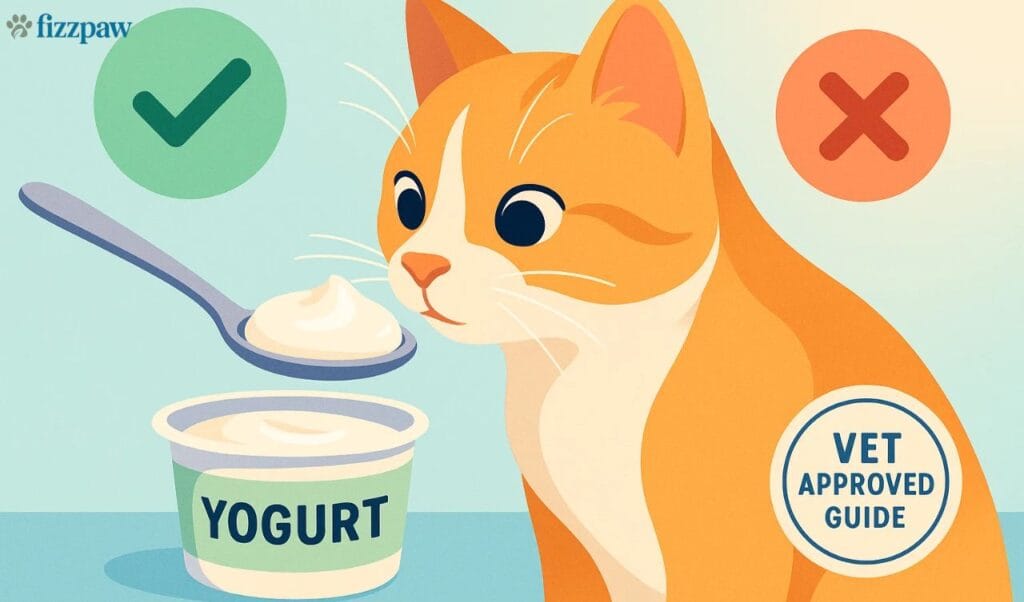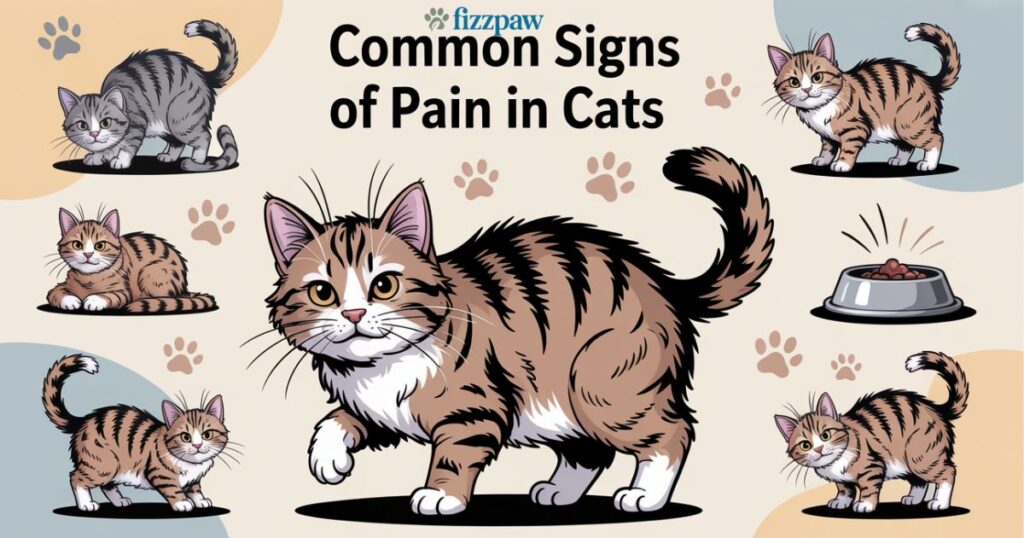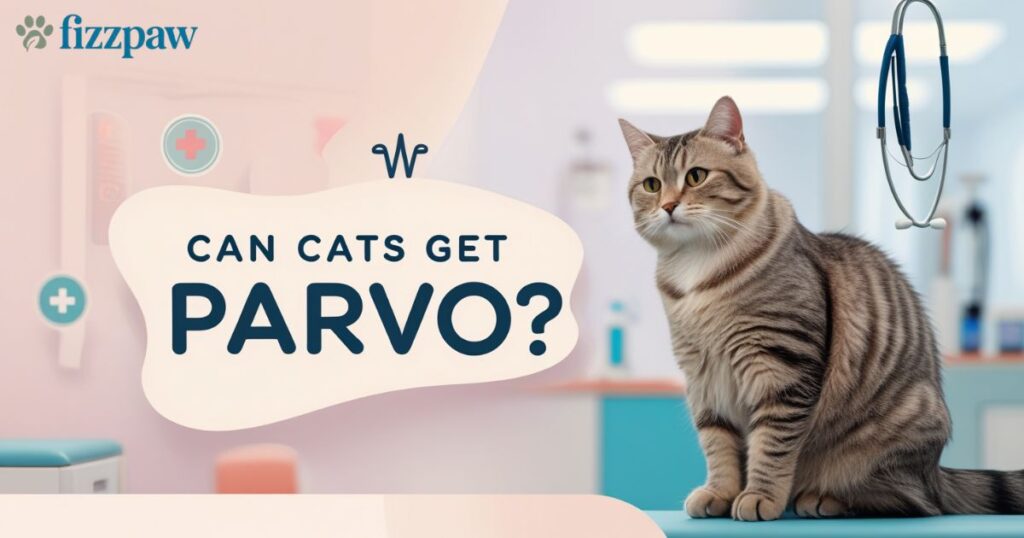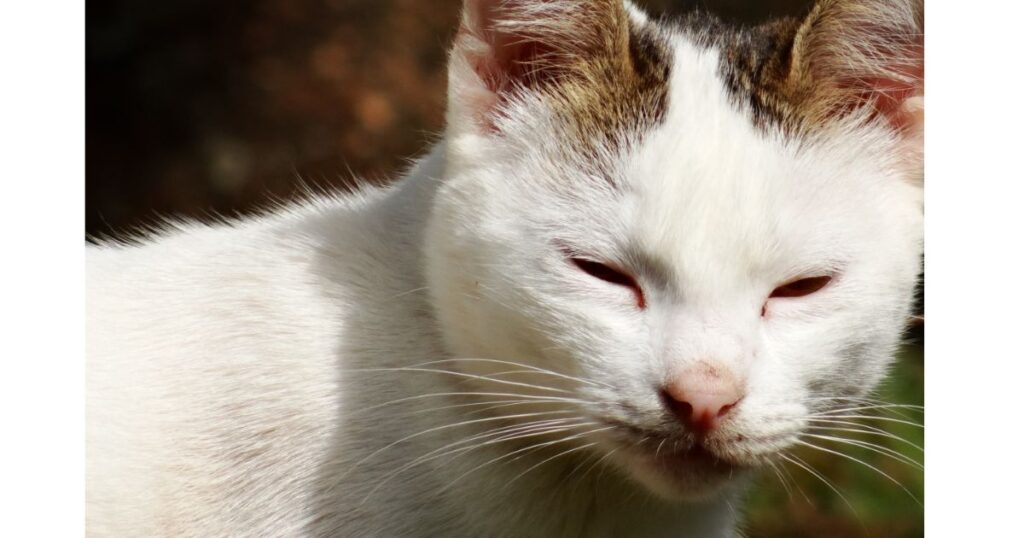Many cat owners wonder, “Can cats eat yogurt?” Since yogurt is healthy for humans, it’s natural to think it might be good for cats too. But cats have unique digestive systems, and dairy doesn’t always sit well with them.
In 2025 veterinarians emphasized that most cats are lactose intolerant, so yogurt might do more harm than good. Still, some types of yogurt might be safer in moderation. This guide will give you a clear, vet-approved answer based on the latest research, so you can safely decide whether the limits of a cat’s diet should be extended to eating yogurt.
Can Cats Eat Yogurt?
The quick answer is yes cats can eat yogurt -but only in moderation, and only in certain types.
2025 Veterinary Research on Cats, plain yogurt that is not sweetened can be considered a safe treat for adult cats who are healthy and especially Greek yogurt. Yogurt is packed with proteins, probiotics and calcium – everything your cat needs to aid with digestion and overall general health.
However, vets also emphasize that:
- Most cats are lactose intolerant so if you give him too much yogurt you could eventually cause some diarrhea, bloating, or stomach upset. You can also read the related article: Natural Remedies for Cat Diarrhea
- Flavored or sweetened yogurts (especially those with xylitol, chocolate, or fruit additives) are unsafe and toxic for cats.
- Yogurt should never replace a cat’s balanced diet and should only make up less than 10% of their daily calories.
Yogurt is not necessary but can be a safe, tiny treat for cats in moderation.
Is Yogurt Safe for Cats in 2025?
The issue of the safety of yogurt to cats is a topic of debate for many years. Many pet owners believe that since cats are fond of milk, yogurt should also be healthy for cats. However, in 2025, veterinary research provides a more clear picture. Yogurt is safe when consumed in moderation, however it is contingent on the way your cat’s body reacts to dairy, and the kind of yogurt you give them. Let’s take it in steps.
Understanding Lactose Intolerance in Cats
Most cats are lactose intolerant, which means their digestive system struggles to break down lactose (the sugar found in milk). After kittenhood, cats lose much of the enzyme lactase that digests lactose. When they consume too much dairy, it can lead to:
- Diarrhea
- Gas and bloating
- Stomach cramps
- Loose stools
Why Yogurt Differs from Milk
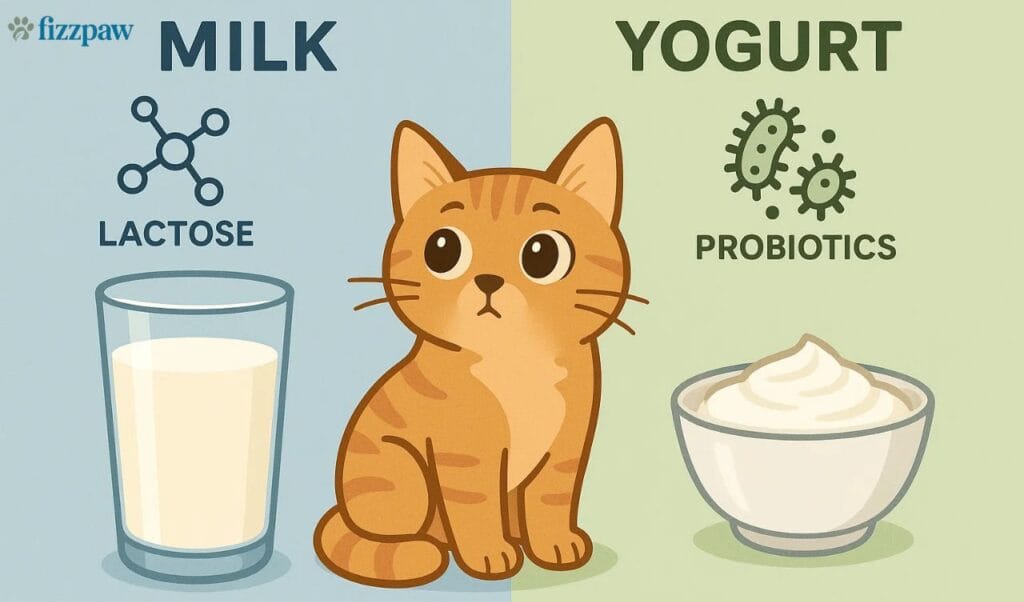
The good news is that yogurt isn’t identical to milk. In the process of fermentation, beneficial bacteria breakdown a lot of the lactose present in yogurt. It is because yogurt typically has lesser lactose levels than normal milk which makes it much easier for cats to tolerate even in tiny amounts.
In fact:
- Greek yogurt contains even less lactose compared to regular yogurt.
- Yogurt is rich in probiotics that can help support a healthy digestive system.
- The thicker texture makes it harder for cats to overeat compared to milk.
Still, tolerance varies. Some cats handle a teaspoon of yogurt just fine, while others get stomach upset after even a small lick.
Veterinary Research and Consensus
According to the 2025 veterinary guidelines, yogurt is considered “conditionally safe” for cats:
- Safe: Plain, unsweetened, probiotic-rich yogurt in very small amounts.
- Unsafe: Flavored yogurts, those with added sugars, artificial sweeteners (xylitol is deadly for cats), or mix-ins like chocolate or raisins.
- Not Necessary: Yogurt should never replace a balanced cat diet. Cats do not “need” yogurt, but a little taste once in a while is not harmful if they tolerate it.
Yogurt is a treat, not a staple. The safest approach is occasional, tiny servings and close monitoring for digestive reactions.
Can Kittens Eat Yogurt?
For kittens, yogurt rules are different. Adult cats can eat only a tiny amount of yogurt, but kittens are less tolerant. They’re still young and the thought of giving the yogurt too early may cause more harm than good.
Risks for Kittens Compared to Adult Cats
Unlike adult cats, kittens are still building their immune system and gut health. Giving yogurt to a kitten can cause:
- Acute diarrhea can lead to rapid dehydration.
- Stomach pain and gas, since their bodies can’t properly handle fermented dairy.
- Nutritional imbalance, because yogurt is not designed to meet the dietary needs of growing kittens.
Kittens require a diet which is high in protein and specially designed to encourage growth. Yogurt can’t provide these vital nutrients in the right balance.
Important: While yogurt is considered to be safe for kittens, it may cause digestive problems and hinder the absorption of the nutrients they receive from their food.
Why Young Cats Are More Sensitive to Dairy
Kittens are born with the enzyme lactase, which enables them to digest their mother’s milk. But their lactase levels drop once they have been weaned. This means they are more susceptible to lactose intolerance than some mature cats, who can sometimes tolerate small amounts.
Additional reasons why kittens should avoid yogurt:
- Their gut microbiome is immature, so probiotics in yogurt may not work the same way as in adult cats.
- Flavored or sweetened yogurt (sometimes mistakenly given by owners) can be toxic, especially if it contains xylitol or artificial additives.
- The risk of dehydration from diarrhea is much higher in kittens than adults, making even small mistakes dangerous.
Kittens should not be given yogurt. Instead, provide kitten milk replacer (KMR) if extra supplementation is needed.
Comparison: Kittens vs Adult Cats (Yogurt Tolerance)
| Factor | Kittens | Adult Cats |
| Lactose tolerance | Very low after weaning | Slightly higher in some cats |
| Digestive system | Immature, highly sensitive | Fully developed |
| Risk of diarrhea | High (can cause dehydration) | Moderate (usually mild) |
| Nutritional needs | High protein, no dairy required | Protein-focused, can handle tiny treats |
| Safe to give yogurt? | No | Small amounts, plain and unsweetened |
Benefits of Yogurt for Cats
Many cat Lovers believe yogurt is a “healthy treat,” and to some extent, this is true. Yogurt does offer certain nutritional advantages for cats, but it is not a necessary part of their diet. Cats are obligate carnivores, meaning their primary nutrition must come from animal protein. Still, a small spoonful of plain yogurt can sometimes support digestive health and provide extra nutrients. Let’s look at the benefits more closely.
Probiotics and Digestive Health
One of the most talked-about benefits of yogurt is its probiotic content. Probiotics are “good bacteria” that can help balance the gut microbiome. For some cats, these live cultures may:
- Aids digestion and reduces occasional constipation or diarrhea.
- Support gut health after a course of antibiotics.
- Improve nutrient absorption, especially in older cats with weaker digestion.
Fact: A 2024 veterinary study noted that while probiotics in yogurt can help gut health, cat-specific probiotic supplements are safer and more effective than relying on yogurt.
Protein, Calcium, and Essential Nutrients
Yogurt also contains some useful nutrients that cats can benefit from in small amounts:
- Protein → Helps maintain muscle mass and energy.
- Calcium → Supports strong bones and teeth.
- B vitamins → Aid metabolism and keep skin/coat healthy.
- Magnesium & potassium → Support heart and nerve function.
Quick Look at Yogurt’s Nutrients (per tablespoon)
| Nutrient | Amount (approx.) | Benefit for Cats |
| Protein | 1.5 g | Builds muscle & energy |
| Calcium | 50 mg | Strengthens bones |
| Vitamin B12 | Trace | Supports brain & metabolism |
| Probiotics | Varies | May improve gut health |
Why Yogurt’s Benefits Remain Limited
Even with these nutrients, yogurt is not a superfood for cats. Its benefits are limited because:
- Cats already get complete nutrition from their high-protein cat food.
- Most cats are lactose intolerant, so even plain yogurt can upset their stomach.
- The probiotic strains in yogurt are designed for humans, not cats—so the effects may be weaker.
- Flavored or sweetened yogurts can be harmful, especially if they contain artificial sweeteners like xylitol.
Yogurt can be used as an occasional treat, but it should never replace a balanced cat diet or vet-recommended supplements.
Risks and Side Effects of Feeding Cats Yogurt
While yogurt may seem harmless, it isn’t always safe for every cat. Cats process dairy differently than humans, and even small amounts can cause issues. Before you share a spoonful of yogurt with your feline friend, it’s important to understand the possible risks and side effects.
Digestive Upset and Diarrhea
The most common reaction cats have to yogurt is stomach upset. Since most cats are lactose intolerant, even yogurt with lower lactose levels can cause:
- Diarrhea or soft stools.
- Stomach cramps or abdominal discomfort.
- Nausea and vomiting in sensitive cats.
If your cat experiences loose stools or vomiting after eating yogurt, stop immediately and avoid giving dairy in the future.
Long-Term Health Concerns if Overfed
Occasional small amounts may not be harmful, but regular feeding of yogurt can lead to problems over time:
- Weight gain – yogurt contains calories and natural sugars that can contribute to feline obesity.
- Pancreatic stress – fatty yogurts may increase the risk of pancreatitis in some cats.
- Nutrient imbalance – cats need specific nutrients from meat; relying on yogurt doesn’t meet their dietary needs.
Overfeeding can turn a “treat” into a health risk, especially in indoor cats with less activity.
Lactose Intolerance and Bloating Issues
Most adult cats lack lactase, the enzyme needed to digest lactose. This makes them prone to digestive trouble with dairy, including yogurt. Symptoms of lactose intolerance may include:
- Excessive gas and bloating
- Flatulence with foul odor
- Dehydration from prolonged diarrhea
Even if yogurt contains less lactose than milk, it’s still enough to trigger discomfort in many cats.
Flavored yogurts (especially those with xylitol, artificial sweeteners, or fruit additives) are toxic and should never be given to cats.
Types of Yogurt: Which Are Safe, Which to Avoid
Not all yogurts are created equal when it comes to feline health. While some plain varieties may be safe in moderation, others contain hidden ingredients that are dangerous for cats. Here’s what you need to know before sharing a spoonful.
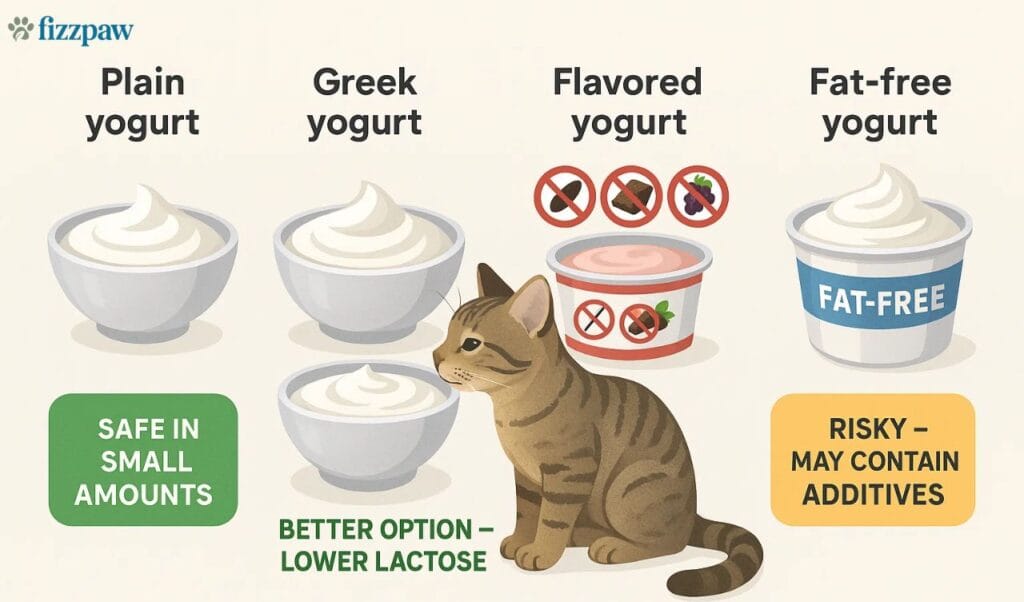
Plain vs. Greek Yogurt
- Plain yogurt (unsweetened, without additives) is the only type considered relatively safe for cats.
- Greek yogurt is often a better option because it contains less lactose and is thicker, which some cats tolerate more easily.
If you ever offer yogurt, choose plain, unsweetened Greek yogurt in very small amounts.
Hidden Dangers in Flavored Yogurts (Xylitol, Chocolate, Grapes)
Flavored yogurts may contain toxic ingredients for cats, such as:
- Xylitol – an artificial sweetener that is highly toxic to cats, even in tiny doses.
- Chocolate – contains theobromine and caffeine, both dangerous to feline health.
- Fruit additives like grapes or raisins can cause kidney damage.
- Sugary fruit syrups – add unnecessary calories and sugar, leading to obesity and diabetes risk.
Never feed flavored yogurts to cats, even as a small treat.
Fat-Free vs. Full-Fat Yogurt Options
- Fat-free yogurt – may seem “healthier,” but often contains artificial sweeteners or thickeners that cats should not consume.
- Full-fat yogurt – safer in its natural form, but must be given in moderation, as high-fat intake can lead to pancreatitis and obesity.
The safest choice is plain, unsweetened, low-fat Greek yogurt — and only as an occasional treat.
Can Cats Eat Frozen Yogurt?
Frozen yogurt may sound like a fun treat, but it’s generally not safe for cats. Here’s why:
- Commercial frozen yogurts often contain sugar, chocolate, artificial flavors, or xylitol.
- The freezing process doesn’t reduce lactose, meaning sensitive cats can still get diarrhea or bloating.
- Cold foods can also cause stomach shock in some cats, leading to vomiting.
Conclusion: Cats should avoid frozen yogurt. If you want a cold treat, try cat-safe frozen broth cubes or pureed pumpkin instead.
How Much Yogurt Can Cats Eat? (Feeding Guidelines)
Portion Size — Teaspoon Rules
Only a teaspoon at a time is safe. More than that risks digestive upset.
Frequency and Treat Guidelines
Yogurt should not be consumed daily. Keep servings limited to once weekly or less.
The 10% Daily Calorie Rule for Cat Treats
All treats, including yogurt, should never exceed 10% of daily calories. For most cats, this means yogurt must remain a very small portion.
Safer Alternatives to Yogurt for Cats
While a small lick of yogurt may be safe, there are better, safer, and more effective options for supporting your cat’s digestion and overall health.
Also Read : Best Cat Food for Skin Allergies
Cat-Specific Probiotic Supplements
- Specially formulated probiotic powders, chews, or capsules for cats deliver healthy gut bacteria without the risks of dairy.
- Unlike yogurt, probiotics for cats don’t trigger bloating or diarrhea.
Vet-Approved Snacks for Digestive Health
- High-fiber cat treats (with pumpkin or psyllium) help regulate digestion safely.
- Choose products labelled AAFCO-approved for complete safety and balance.
Tip: Always check calories—treats should still follow the 10% rule.
Natural Treats That Provide Similar Benefits
- Pumpkin (plain, canned, or cooked): A rich fiber source that supports smooth digestion.
- Goat milk for pets: Easier to digest than cow’s milk, but should still be limited.
- Bone broth (unsalted, no onions/garlic): Hydrates cats while providing nutrients.
- Freeze-dried meats (chicken, salmon, turkey): High in protein and gut-friendly without dairy risks.
These natural options provide digestive support and tasty variety without the lactose-related issues of yogurt.
Signs Your Cat Shouldn’t Eat Yogurt
Even if yogurt is generally safe in small amounts, some cats react poorly to it. Spotting the signs early helps prevent discomfort and long-term health problems.
| Symptom | Possible Cause | Action |
| Diarrhea / Loose stool | Lactose intolerance | Stop yogurt, monitor hydration |
| Vomiting | Digestive upset | Avoid dairy, seek vet if persists |
| Excessive Gas / Bloating | Gut irritation | Do not feed again |
| Itchy skin / Ear inflammation | Dairy allergy | Contact vet |
| Lethargy, refusal to eat | Severe intolerance/allergy | Immediate vet visit |
Recognizing Digestive Distress (Diarrhea, Vomiting, Gas)
- Loose stools, diarrhea, or vomiting soon after eating yogurt usually mean your cat is lactose intolerant.
- Excessive gas, bloating, or stomach gurgling are also signs that the dairy is irritating their gut.
- If these symptoms last longer than 24 hours, stop feeding yogurt immediately.
Allergy Reactions to Dairy Products
- While rare, cats can have food allergies to milk proteins.
- Warning signs include:
- Itchy skin or face rubbing
- Ear inflammation
- Excessive scratching or licking
- Hair loss or scabs
- Itchy skin or face rubbing
- Unlike simple lactose intolerance, allergies tend to get worse over time if exposure continues.
When to Contact a Veterinarian
- Call your vet if:
- Diarrhea or vomiting lasts more than a day
- Your cat becomes lethargic, dehydrated, or refuses food
- You notice signs of allergy or blood in stool
- Diarrhea or vomiting lasts more than a day
- Your vet may recommend switching to probiotics, prescription diets, or other safe supplements instead of yogurt.
also read : Why Do My Cat Drooling?
FAQs About Cats and Yogurt
Is it safe to give cats yogurt?
Yes — but only plain, unsweetened yogurt and in tiny amounts (about 1 teaspoon occasionally). Even then, not all cats tolerate it well because of lactose sensitivity. Always monitor for digestive upset.
Why are cats obsessed with yogurt?
Cats are curious by nature and often drawn to the smell of fermented dairy. The creamy texture and slight tang also mimic the scent of animal-based proteins, which attracts them — but this doesn’t mean it’s automatically safe.
Can my cat lick my yogurt?
A small lick is generally not harmful if it’s plain yogurt. But avoid letting your cat share flavored yogurts since they may contain sugar, xylitol, or artificial sweeteners, which are toxic to cats.
Can cats eat ice cream?
No — ice cream is unsafe for cats. It contains high sugar, lactose, and sometimes chocolate or artificial sweeteners, all of which can cause digestive upset or toxicity.
Can cats eat peanut butter?
Peanut butter isn’t toxic, but it’s not recommended. It’s high in fat, difficult for cats to digest, and sometimes contains xylitol, which is deadly for cats. If you want to treat your cat, stick to vet-approved snacks instead.
Final Thoughts — Can Cats Eat Yogurt?
Yogurt for cats in 2025 is a matter of moderation and diligence. Plain unsweetened yoghurt It won’t hurt as an occasional treat – use a full or half teaspoon – but most cats won’t get that much long-term benefit for you. Yogurt is not a necessity for cats, and since many are lactose intolerant, it may lead to diarrhea if offered too frequently.
If you want to improve your feline’s gut health and digestion, go for something safer like vet-approved probiotics, cat-formulated treats, or a holistic dietary supplement, which are known to be far more reliable.
Bottom line: Yogurt isn’t harmful in small amounts, but it should never replace a balanced, vet-approved diet. When in doubt, always check with your veterinarian before introducing any new food to your cat’s routine.

